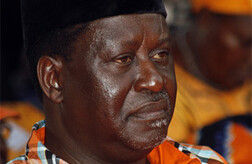Kenya's warring politicians may finally reach a truce in the coming days, with the aid of former United Nations Secretary-General Kofi Annan. But the 1,000 deaths caused by feuding ethnic groups have left deep scars that promise to haunt any settlement—unless a power-sharing deal addresses the deep structural issues that caused the crisis.
Although democracy is often heralded as the key to progress in the developing world, competitive elections can incite violence in fragmented countries if they appear to leave one ethnic or religious group dominant at the expense of others. In states such as Kenya with a tenuous concept of nationhood, institutions need to distribute resources equitably if they are to foster stability and growth.
In Kenya—as in similarly fragmented countries such as Iraq, Nigeria, and Bolivia—politics is a zero-sum game because winners all too often monopolize the government's resources at the expense of the losers. Different identity groups see each other as hostile entities with fundamentally opposing agendas. Weak national institutions exacerbate the divisions because they can't effectively discipline the clique in power. Corruption thrives.
In Kenya, the Kikuyu has long dominated the levers of power at the expense of other groups. Not only did it control the key ministries of finance, defense, information, and internal security in the preelection government, but it also owned a disproportionate amount of the country's wealth and fertile land.
The incestuous relationship between a state controlled by a narrow elite and an ethnic group that makes up only 22 percent of the population naturally inflames others' passions. Raila Odinga, the opposition candidate in the recent election, garnered substantial majorities among the Luo, Luhya, and Kalenjin communities that feel excluded with the slogan: "It's our turn to eat." By contrast, more than 90 percent of the Kikuyu-dominated area around Mount Kenya voted for their kinsman, the incumbent Mwai Kibaki.
The inability of Kenya's institutions to curb widespread corruption and favoritism accentuates the electoral stakes—and exacerbates the tensions. Indeed, weak governing bodies encourage a ruling elite to manipulate the state to favor its interests—as Kibaki has apparently done in stuffing the electoral commission with his appointees to ensure his reelection.
Democracy requires a certain degree of cohesiveness among a population, a recognition that diverse interests do not outweigh the common ground that people share. When identity politics displaces any sense of nationhood—a common occurrence in fragile states in Africa, the Middle East, Latin America, and elsewhere—competitive elections risk aggravating societal divisions unless institutions are structured to ensure that all major groups are included.
In Kenya, there are many ways to establish a more stable partnership among the country's 42 ethnic groups. Giving regional governments more power and cash could ensure a fairer distribution of the nation's resources. This federalist approach has lessened ethnic and religious tensions in such diverse countries as India, Nigeria, and Spain. Major tribes, meanwhile, would feel more allegiance to the state if each one held some senior government positions and received a minimum number of government contracts.
More effective institutions will improve the state's ability to confront tribalism—and allow the government to slowly wean itself off many of the policies adopted just for the sake of unity. A fair and competent administration will always find it easier to act for the sake of the general interest than an unfair and incompetent one. Fortifying the judiciary and enforcing anticorruption measures will hold politicians more accountable for their actions. Using exams to help hire and promote government officials—as China has long done—will lessen tribes' ability to undermine the state's personnel system.
Lastly, anything that strengthens the sense of nationhood—such as sports teams, patriotic education, national service, and the rotation of government officials throughout the country—will help reduce the need for ethnic balancing of interests. But the process of creating a Kenyan nation will take generations—and should be seen as such.
Strong states require robust institutions and a cohesive population. Although elections have an essential role to play in holding politicians accountable and in fostering better governance, they cannot be seen as a miracle cure. Fragmented countries need to build institutions that limit group inequities and foster national unity. While Kenya's leaders will need to reach beyond tribalism to solve the current crisis, they may need to take account of tribalism in a new constitution to avoid a recurrence of conflict in the future.
![]() This article is licensed under a Creative Commons License.
This article is licensed under a Creative Commons License.
Please read our usage policy.




